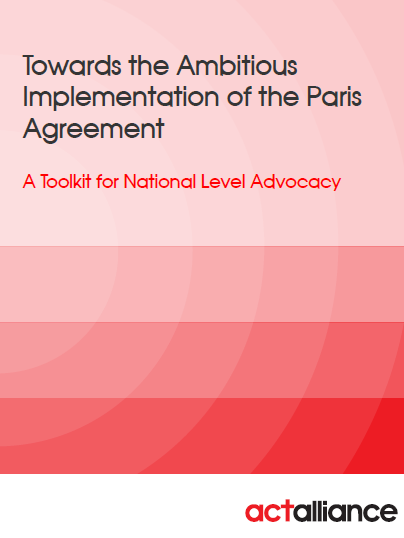
At the inaugural General Assembly of the ACT Alliance in Arusha, Tanzania in 2010, there was widespread consensus amongst members that climate change was threatening the lives and livelihoods of the communities that they serve. Since that first General Assembly, ACT Alliance members and forums across the world have prioritized climate change in their advocacy work.
Today, ACT Alliance continues to advocate for climate justice, particularly in support for community resilience in developing countries, low greenhouse gas emission development, the respective means of implementation and for the full implementation of the Paris Agreement, guided by the principles of equity, human rights and gender justice.
Since the adoption of the Paris Agreement, ACT Alliance has engaged in climate advocacy and capacity building initiatives through a series of regional workshops focused on enabling the national level implementation of the main instruments of the Paris Agreement, namely, the Nationally Determined Contributions (NDCs), National Adaptation Plans (NAPs) and the mid-century long-term low greenhouse gas emissions development strategies or Long-term Strategies (LTS).
ACT Alliance is pleased to share our newest Toolkit for national level advocacy, Towards the Ambitious Implementation of the Paris Agreement. This Toolkit will support the climate change advocacy of ACT members, forums and partners at the national and regional level. It will help faith-based organisations to effectively advocate for key climate goals including keeping global temperature rise to 1.5°C and to bring to life the Alliance’s common vision of shaping our future in ways that take up the call for a strong moral and religious imperative in overcoming the climate crisis.
The Toolkit is composed of three modules, one for each of the three instruments mandated by the Paris Agreement; namely the Nationally Determined Contributions (NDCs), National Adaptation Plans (NAPs) and the mid-century long-term low greenhouse gas emissions development strategies or Long-term Strategies (LTS). Each module follows the same structure, guiding FBOs in a step-by-step process to prepare their national level advocacy plans. The Toolkit incorporates key messages, questions and answers, checklists and lessons learned, as well as diagrams and infographics as visual elements to facilitate the learning process. Best practise examples are used to further illustrate the content. The Toolkit also proposes various advocacy interventions for FBOs, which can be adjusted to suit their local context.
We welcome all of our members and forums to use this Toolkit for advocacy and capacity building and to facilitate internal discussions and reflections to ensure that their national contexts are integrated into our global climate justice work.
The Toolkit is available here in English and here in Spanish.
_______
For any additional information on the Toolkit, please contact Joanna Patouris, Climate Change Communications Coordinator: joanna.patouris@actalliance.org